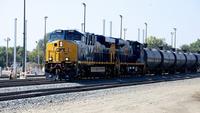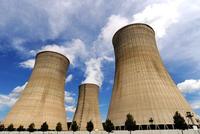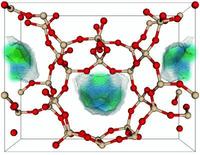-
The power of salt
Where the river meets the sea, there is the potential to harness a significant amount of renewable energy, mechanical engineers say. The researchers evaluated an emerging method of power generation called pressure retarded osmosis (PRO), in which two streams of different salinity are mixed to produce energy. In principle, a PRO system would take in river water and seawater on either side of a semi-permeable membrane. Through osmosis, water from the less-salty stream would cross the membrane to a pre-pressurized saltier side, creating a flow that can be sent through a turbine to recover power.
-
-
Ingredients in “fracking” fluids raise concerns
As the oil and gas drilling technique called hydraulic fracturing (or “fracking”) proliferates, a new study on the contents of the fluids involved in the process raises concerns about several ingredients. The researchers say that out of nearly 200 commonly used compounds, there is very little known about the potential health risks of about one-third, and eight are toxic to mammals.
-
-
Landfills’ stinky gases could transform into clean energy
A new technique which transforms stinky, air-polluting landfill gas could produce the sweet smell of success as it leads to development of a fuel cell generating clean electricity for homes, offices and hospitals, researchers say. The advance would convert methane gas into hydrogen, an efficient, clean form of energy.
-
-
U.S. to impose stricter safety rules on crude oil rail shipment
The U.S. Department of Transportation(DOT) recently announced proposed rulesbetter to secure train cars and pipelines from oil spills that may lead to fire or accidents in communities across the country. The spills are byproducts of the increase in U.S. oil production and shipments coming from Canada or the Bakken oil fields of North Dakota. The proposed DOT rules would force railroads to upgrade railroad cars used for transporting crude oil, employ better braking systems, and enforce tighter speed controls.
-
-
New rules proposed for crude oil shipments
U.S Department of Transportation (DOT) secretary Anthony Foxx has announced that the department is proposing new rules for shipments of high-hazard crude oil by trains, as well as moving to phase out the use of older tank cars that many see as unsafe. The order follows a deadly year for oil train accidents, including a July 2013 derailment in Lac Megantic, Quebec resulting in the deaths of forty-seven people and a 30 April derailment in Lynchburg, Virginia.
-
-
Wastewater injection induces Oklahoma quakes: study
The dramatic increase in earthquakes in central Oklahoma since 2009 is likely attributable to subsurface wastewater injection at just a handful of disposal wells, finds a new study. The researchers say Oklahoma earthquakes constitute nearly half of all central and eastern U.S. seismicity from 2008 to 2013, many occurring in areas of high-rate water disposal.
-
-
The price tag of the 2° climate target
Addressing climate change will require substantial new investment in low-carbon energy and energy efficiency — but no more than what is currently spent on today’s fossil-dominated energy system. To limit climate change to 2° Celsius, low-carbon energy options will need additional investments of about $800 billion a year globally from now to mid-century, according to a new study, but much of that capital, however, could come from shifting subsidies and investments away from fossil fuels and associated technologies. Worldwide, fossil subsidies currently amount to around $500 billion per year.
-
-
Net energy analysis should regarded as a standard policy tool: scientists
It takes energy to make energy, whether it is renewable or a fossil fuel. Net energy analysis gauges the sustainability of energy technologies over time. Net energy analysis provides a quantitative way to compare the amount of energy a technology produces over its lifetime with the energy required to build and maintain it. The technique can complement conventional energy planning, which often focuses on minimizing the financial cost of energy production, Stanford researchers say.
-
-
Heavier oil train traffic in western U.S. causes safety worries
In May, following extensive debate regarding security concerns, U.S. Transportation Secretary Anthony Foxx ordered railroads to share oil train shipment information with states, in order better to inform first responders should an accident occur. In the first quarter of 2014 alone, there were 110,000 carloads of oil. Each train can carry three million gallons of oil.
-
-
Details of oil shipments by rail are not security sensitive and should be released: DOT

The boom in U.S. oil shipments by rail is largely due to the growing production of shale oil from the Bakken fields in North Dakota and Montana, but also due to the slow construction of new oil pipelines. U.S. freight railroads are estimated to have carried 434,000 carloads of crude oil in 2013, compared to 9,500 carloads in 2008. In 2014, 650,000 carloads of crude oil are expected to be carried. So far U.S. crude oil shipments by rail have reached a record 110,000 carloads in the first quarter of 2014. Transportation Secretary Anthony Foxx issued an order in May for railroads to provide states with details on routing and oil-train volumes. Last week, U.S. Department of Transportationofficials affirmed that details about volatile oil train shipments are not sensitive security information, thereby allowing states to release such information to the public.
-
-
ISIS insurgents take over Iraq’s largest refinery, continue advance toward Baghdad
Earlier this morning (Wednesday) ISIS Islamic militants took over Iraq’s biggest oil refinery, located near the town of Baiji, 130 miles north of Baghdad. The fall of the refinery is a major blow to the already-reeling government of Nouri al-Maliki. The refinery provides about 40 percent of Iraq’s refined oil needs, and if the supplies dry up, the Iraqi economy would be paralyzed within a few days, and Iraqi citizens would be without power or gas for their cars. As was the case since the ISIS campaign began late last week, the Iraqi military and security forces put up only a token resistance, with most of their units melting away and leaving their arms and equipment behind without even engaging the militants. Iraq is the second largest oil producer in OPEC.
-
-
Carbon-cutting regulations may boost prospects of nuclear power plants

In a report issued last Thursday, Standard & Poor’s Ratings Services (S&P) predicted that new nuclear plant construction could benefit from the Environmental Protection Agency’s (EPA) recent carbon-cutting guidelines for current natural gas power plants.
-
-
Debate continues over controversial lawsuit-killing Louisiana oil bill
Governor Bobby Jindal (R-Louisiana) is facing a difficult decision over whether or not to veto a measure which would kill a contentious lawsuit filed by the Southeast Louisiana Flood Protection Authority-East (SLFPA-E) against ninety-seven different oil and gas companies regarding long-term environmental damage claims, including those of the 2010 Deepwater Horizon explosion.
-
-
Connecting dead ends increases power grid stability
Climate change mitigation strategies such as the German Energiewende – the post-Fukushima German policy of phasing out nuclear power — require linking vast numbers of new power generation facilities to the grid. As the input from many renewable sources is rather volatile, depending on how much the wind blows or the sun shines, there is a higher risk of local power instabilities and eventually blackouts. Scientists now employed a novel concept from nonlinear systems analysis called basin stability to tackle this challenge.
-
-
New material captures CO2 at natural gas wellheads

Natural gas is the cleanest fossil fuel. Development of cost-effective means to separate carbon dioxide during the production process will improve this advantage over other fossil fuels and enable the economic production of gas resources with higher carbon dioxide content that would be too costly to recover using current carbon capture technologies. Rice University chemists invented a porous material which sequesters carbon dioxide, a greenhouse gas, at ambient temperature with pressure provided by the wellhead, and lets it go once the pressure is released. The material shows promise to replace more costly and energy-intensive processes.
-
More headlines
The long view
Trump Is Fast-Tracking New Coal Mines — Even When They Don’t Make Economic Sense
In Appalachian Tennessee, mines shut down and couldn’t pay their debts. Now a new one is opening under the guise of an “energy emergency.”
Smaller Nuclear Reactors Spark Renewed Interest in a Once-Shunned Energy Source
In the past two years, half the states have taken action to promote nuclear power, from creating nuclear task forces to integrating nuclear into long-term energy plans.
